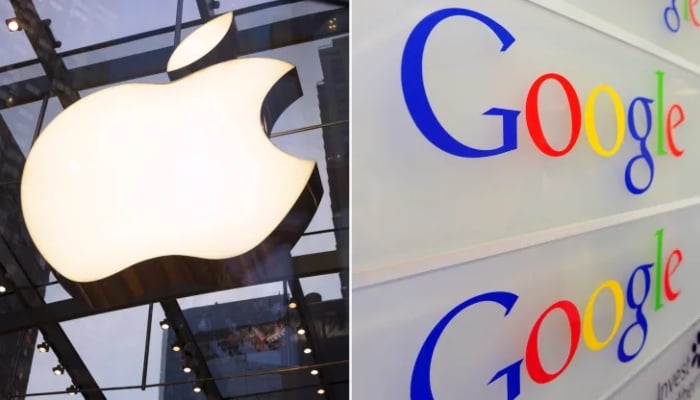Why Apple Might Be Saving Google (And Why It Matters)

Table of Contents
The iOS Ecosystem and Google's Search Dominance
Apple's partnership with Google as its default search engine is not just a contract; it's a lifeline for Google's financial stability and market share. This arrangement generates billions of dollars annually for Google, a sum that significantly impacts its bottom line and allows for continued investment in research and development.
- Financial Implications: The revenue Google receives from being the default search engine on iOS is astronomical. This income stream allows Google to fund its vast infrastructure, AI projects, and other ambitious initiatives. Losing this partnership would severely impact Google's financial health.
- Reach and Influence: The iOS ecosystem boasts hundreds of millions of users globally. This massive audience translates to unparalleled reach for Google Search, solidifying its position as the world's most used search engine. The sheer volume of searches conducted via iOS devices contributes significantly to Google's overall market share.
- Potential Alternatives: While Apple could theoretically switch to a different default search engine (like Bing or DuckDuckGo), the impact on Google would be catastrophic. The loss of iOS users would represent a significant blow to Google's search revenue and market dominance.
Apple's Privacy Focus Indirectly Benefits Google (Paradoxically)
Apple's strong focus on user privacy, a cornerstone of its brand identity, creates a seemingly contradictory benefit for Google. While Apple's privacy measures directly compete with Google's data-driven model, they also inadvertently hinder the growth of smaller search engines.
- Data Collection Challenges: Apple's stringent privacy features make it difficult for smaller search engines to collect the granular user data necessary for effective search personalization and competition. This data advantage remains a core strength for Google.
- User Inertia: Apple's emphasis on privacy can inadvertently discourage users from experimenting with alternative search engines. The perceived simplicity and security of the Apple ecosystem, paired with Google's default integration, reduces the likelihood of users switching to different platforms.
- Contrasting Approaches: The contrast between Apple's privacy-centric approach and Google's data-heavy model is stark. While Apple prioritizes user control and data minimization, Google leverages vast data sets to personalize search results and target advertising.
The Interdependence of App Stores and Google Services
The deep integration of Google services (Maps, YouTube, Gmail, etc.) within the Apple App Store benefits both companies, but it arguably strengthens Google's position more significantly. This integration creates a seamless user experience that encourages continued use of Google services.
- Seamless User Experience: The intuitive integration of Google services within the Apple ecosystem creates a frictionless user experience, minimizing the incentive for users to seek alternative applications or services.
- Ecosystem Lock-in: This integration contributes to the ecosystem lock-in, making it less likely that users will switch to alternative app ecosystems, thereby ensuring a continued flow of users to Google services.
- Revenue Streams: The interwoven nature of these ecosystems generates significant revenue streams for both companies, further reinforcing their interdependent relationship.
The Threat of a Post-Apple World for Google
It's crucial to consider the hypothetical scenario where Apple significantly reduces its reliance on Google or switches its default search engine. The implications for Google would be profound.
- Financial Impact: The loss of revenue from the Apple partnership would be a massive blow to Google's financial performance, potentially impacting investment in future projects.
- Market Share Impact: A significant reduction in iOS users utilizing Google Search could erode Google's market share, opening doors for competitors like Bing or DuckDuckGo.
- Strategic Adjustments: Facing a reduced presence on iOS, Google would be forced to drastically adjust its strategies, potentially increasing its investment in alternative platforms and focusing on user acquisition through other means.
Conclusion: Apple's Unexpected Role in Google's Future
The seemingly contradictory relationship between Apple and Google is complex, showcasing cooperation and competition existing simultaneously. Apple's actions, while ostensibly independent, are undeniably crucial for Google's continued success. Apple's privacy focus, its default search engine partnership, and the integration of Google services within its App Store collectively contribute to Google's market dominance. Understanding the symbiotic relationship between Apple and Google is key to understanding the future of search. Learn more about how Apple might be saving Google and what it means for the tech world.

Featured Posts
-
 Danse Avec Les Stars Le Verdict Sur L Ouverture D Ines Reg Et La Performance De Natasha St Pier
May 12, 2025
Danse Avec Les Stars Le Verdict Sur L Ouverture D Ines Reg Et La Performance De Natasha St Pier
May 12, 2025 -
 Analyzing Payton Pritchards Rise The Path To Sixth Man Of The Year Consideration
May 12, 2025
Analyzing Payton Pritchards Rise The Path To Sixth Man Of The Year Consideration
May 12, 2025 -
 Uruguays Emerging Role As A Premier International Shooting Location
May 12, 2025
Uruguays Emerging Role As A Premier International Shooting Location
May 12, 2025 -
 April 1 3 Yankees Vs Diamondbacks Injury Report And Lineup Impact
May 12, 2025
April 1 3 Yankees Vs Diamondbacks Injury Report And Lineup Impact
May 12, 2025 -
 From Bellator Defeat To Ufc Victory Manon Fiorots Journey
May 12, 2025
From Bellator Defeat To Ufc Victory Manon Fiorots Journey
May 12, 2025
Latest Posts
-
 Het Einde Van Een Icoon Thomas Mueller En Bayern Muenchen Gaan Uit Elkaar
May 12, 2025
Het Einde Van Een Icoon Thomas Mueller En Bayern Muenchen Gaan Uit Elkaar
May 12, 2025 -
 Het Afscheid Van Thomas Mueller Een Bittere Pil Voor Bayern Muenchen
May 12, 2025
Het Afscheid Van Thomas Mueller Een Bittere Pil Voor Bayern Muenchen
May 12, 2025 -
 De Vernedering Van Kompany Analyse Van De Mislukking
May 12, 2025
De Vernedering Van Kompany Analyse Van De Mislukking
May 12, 2025 -
 Kompanys Team Lijdt Vernederende Verlies
May 12, 2025
Kompanys Team Lijdt Vernederende Verlies
May 12, 2025 -
 Bitter Einde Voor Bayern Muenchen Het Vertrek Van Thomas Mueller
May 12, 2025
Bitter Einde Voor Bayern Muenchen Het Vertrek Van Thomas Mueller
May 12, 2025
